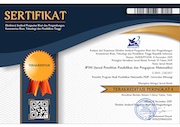Penerapan scaffolding untuk pencapaian kemandirian belajar siswa
Abstract
The purpose of this study was to analyse the achievement of student learning independence through scaffolding application. This study was a quasi-experimental research with involving two classes using purposive sampling. The population in this study was the student of class VIII in one of the public junior high school in Tasikmalaya district involving two classes as the sample. The data collection technique used was non-test. The test instrument according to the indicator the ability while the non-test by questionnaire. The data analyse performance Method of Successive Interval. The research result showed that ability of the student who gets scaffolding learning is higher than the student who gets direct learning, the student learning independence of student who gets scaffolding learning is better than students who get direct learning, and the student learning independence of student who gets scaffolding is in the high category.
Full Text:
view PDFReferences
Anghileri, J. (2006). Scaffolding Practices That Enhance Mathematics Learning. Journal of Mathematics Teacher Education 9: 33–52 .Springer
Hidayat, Edi. (2009). Peningkatan Kemampuan Komunikasi Matematik dan Kemandirian Belajar Siswa Sekolah Menengah Pertama Dengan Menggunakan Pendekatam Matematika Realistik. Tesis: Tidak diterbitkan
Kusworo, Pramudyo & Hardinto, Prih (2009). Efektivitas Penerapan Pendekatan Scaffolding dalam Ketuntasan Belajar EKonomi Siswa Kelas X Sma Labortorium Universitas Negeri Malang. JPE-Volume 2, Nomor 1
Knain, E & Turmo, A (2002). 8 Self- Regulated Learning. (Online). Tersedia dalam: www.pisa.no/kap8.pdf. (4 Februari 2014).
Pannen, P. dkk. (2001). Konstruktivisme dalam pembelajaran. Jakarta PAU-PPAI Universitas Terbuka.
Sumarmo, U., et al. (2000). Pengembangan Model Pembelajaran Matematika untuk Meningkatkan Kemampuan Intelektual Tingkat Tinggi Siswa Sekolah Dasar. Laporan Hibah Bersaing Tahap I, Tahap II, dan Tahap III.: tidak diterbitkan.
Sumarmo, U (2004). Kemandirian Belajar: Apa, Mengapa, dan Bagaimana Dikembangkan pada Peserta Didik. Makalah Pada Seminar Tingkat Nasional. FPMIPA UNY . Yogyakarta Tanggal 8 Juli 2004.
Sutiarso, S. (2000). Problem Posing, Strategi Efektif Meningkatkan Aktivitas Siswa dalam Pembelajaran Matematika. Makalah pada seminar di Bandung: tidak diterbitkan.
Tilman, K.J & Weiss, M (2000). Self-Regulated Learning as Cross-Curriculer Competence (PISA). (Online). Tersedia dalam: www.pisa.no/pdf. (4 Februari 2014).
DOI: https://doi.org/10.37058/jp3m.v3i1.197
Refbacks
- There are currently no refbacks.
©2017 JP3M (Jurnal Penelitian Pendidikan dan Pengajaran Matematika)
Program Studi Pendidikan Matematika
Fakultas Keguruan dan Ilmu PendidikanÂ
Universitas Siliwangi
Jl. Siliwangi No. 24 Kota Tasikmalaya - 46115
email: jp3m@unsil.ac.id
e-ISSN: 2581-2807 ; p-ISSN: 2460-8599

This work is licensed under a Creative Commons Attribution-NonCommercial-ShareAlike 4.0 International License.
StatCounter:
Detail


